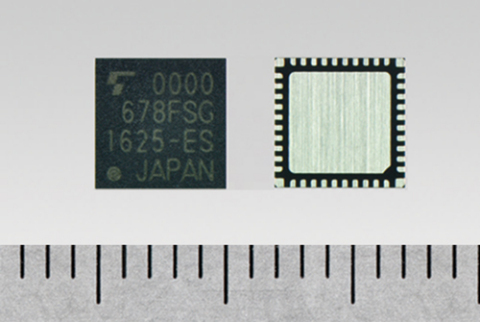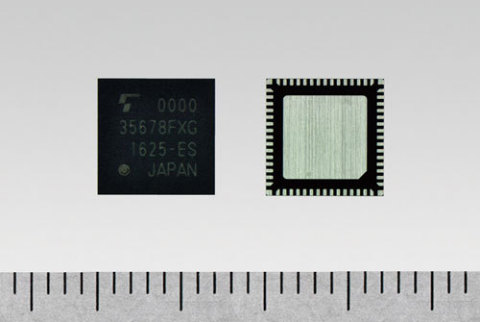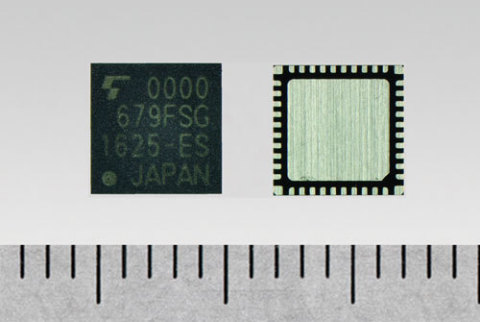TOKYO--(BUSINESS WIRE)--Toshiba Corporation's (TOKYO: 6502) Storage & Electronic Devices Solutions Company today announced the launch of three new ICs “TC35678FSG”, “TC35678FXG” and “TC35679FSG” as additions to its line-up of ICs that support Bluetooth® Low Energy (LE)[1] ver.4.1 communications. At 3V supply voltage, the new ICs consume just under half the power of Toshiba’s previous products[2], and realize current consumption on par with the lowest in the industry[3]. Sample shipments start today, with mass production scheduled to start by the end of 2016 for “TC35678FXG” and in early 2017 for the other two ICs.
Adoption of a highly efficient DC-DC converter introduced in earlier products and an original low-power circuit design secures a nearly 46% current reduction and peak current consumption of 3.6 mA at 3V supply voltage in transmitting mode.
Both “TC35678FXG” and “TC35678FSG” incorporate built-in Flash ROM to store user programs and various data in stand-alone operations. Although memory capacity for user programs was only 64 KB in previous products, it is now extended to 100 KB in both ICs, contributing to the expandability of application programs.
The built-in Flash ROM eliminates any need for external EEPROM, previously required for stand-alone operations. This contributes to cost and mounting-area reduction by reducing external parts count.
“TC35678FXG” is a repackaged “TC35678FSG” in a QFN60 package that extends the number of general purpose IO from 16 to 32. It is suitable for equipment that requires a large number of control pins such as keyboards and remote-controllers.
“TC35679FSG” has no built-in Flash ROM and can achieve extremely low current operation by reducing current consumption for access to Flash ROM. It accordingly achieves long operating times for applications powered by small coin batteries. For example, using a CR2032 type coin battery, the new IC can carry out beacon operation for over a year[4].
The new ICs will facilitate adoption of Bluetooth® LE communications for wearable devices for healthcare applications and for high grade small devices that use coin batteries such as sensors and toys, and will support set makers in optimizing product value.
Key Features
- Low power consumption:
3.6 mA (Transmitter operation @3.0 V, Output power: 0 dBm)
3.3 mA
(Receiver operation @3.0 V)
Less than 100nA in deep sleep (@3.0V)
- Receiver sensitivity: -93 dBm
- Supports Bluetooth® LE
ver.4.1 central and peripheral devices
- Built-in GATT (Generic
Attribute Profile)
- Supports servers and client functions defined
by GATT
- Built-in 256 KB Flash ROM (TC35678FSG/FXG)
Applications
Bluetooth® Smart devices[5], such as wearable devices, healthcare devices, smart phone accessories, remote controllers and toys.
|
Main Specifications |
||||
| Part Number | TC35678FSG/FXG | TC35679FSG | ||
| Operating voltage range | 1.8V to 3.6V | |||
|
Current consumption in |
3.6 mA (@3.0 V, Output power : 0 dBm ) | |||
|
Current consumption in |
3.3 mA (@3.0V) | |||
|
Current consumption in |
Less than 100nA (@3.0V) | |||
|
Operating temperature |
-40°C to 85 °C | |||
| Package |
QFN40 5 mm x 5 mm 0.4 mm
QFN60 7 mm x 7 mm 0.4 mm |
QFN40 5 mm x 5 mm 0.4 mm |
||
|
Wireless |
Bluetooth® Low Energy ver.4.1
Including central and peripheral functions |
|||
| CPU | ARM® Cortex®-M0 | |||
|
Transmitter output |
0 dBm to -20 dBm (4 dB steps) | |||
| Receiver sensitivity | -93.0dBm | |||
| Profiles |
HCI, GATT (Generic Attribute Profile), including server and |
|||
| Interfaces | UART, I2C, SPI, GPIO | |||
| Flash ROM | 256 KB | - | ||
| Other features |
DC-DC Converter
Low drop regulator General purpose ADC User program function Wake up signal for host device PWM function |
|||
Notes:
[1]: Low-power-consumption communication technology defined in Bluetooth®
ver. 4.1.
[2]: Compared to Toshiba’s “TC35667FTG”.
[3]:
Products with the same ratings (current consumption of 3.6 milliamps
(mA) at 3V in transmitting mode with 0dBm) are the lowest in the
industry as of July 14, 2016, Toshiba survey.
[4]: Calculated with
a 220mAh battery and 2-second beacon interval time.
[5]: Devices
that adopt Bluetooth core specification ver.4.1 or higher with
low-energy core configuration, and that use GATT-based architecture
specified in Bluetooth ver.4.0.
* The Bluetooth® word mark and logos are registered trademarks owned by the Bluetooth SIG, Inc. and any use of such marks by Toshiba is under license. Other trademarks and trade names are those of their respective owners.
* ARM and Cortex are registered trademarks of ARM Limited (or its subsidiaries) in the EU and/or elsewhere.
For more information about the new products, please visit:
http://toshiba.semicon-storage.com/ap-en/product/wireless-communication/bluetooth/con-app.html#tc35678
For more information about Toshiba Bluetooth® wireless
technology ICs, please visit:
http://toshiba.semicon-storage.com/ap-en/product/wireless-communication/bluetooth.html
Customer Inquiries:
Mixed Signal IC Sales and Marketing Department
Tel: +81-44-548-2821
http://toshiba.semicon-storage.com/ap-en/contact.html
*Information in this document, including product prices and specifications, content of services and contact information, is current on the date of the announcement but is subject to change without prior notice.
About Toshiba
Toshiba Corporation, a Fortune Global 500 company, channels world-class capabilities in advanced electronic and electrical product and systems into three focus business fields: Energy that sustains everyday life, that is cleaner and safer; Infrastructure that sustains quality of life; and Storage that sustains the advanced information society. Guided by the principles of The Basic Commitment of the Toshiba Group, “Committed to People, Committed to the Future”, Toshiba promotes global operations and is contributing to the realization of a world where generations to come can live better lives.
Founded in Tokyo in 1875, today’s Toshiba is at the heart of a global
network of 550 consolidated companies employing 188,000 people
worldwide, with annual sales surpassing 5.6 trillion yen (US$50
billion). (As of March 31, 2016.)
To find out more about Toshiba,
visit www.toshiba.co.jp/index.htm






